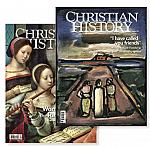Editor's note: Spiritual friendships

[Jennifer Woodruff Tait, Managing Editor of Christian History]
I EXPERIENCED SPIRITUAL FRIENDSHIP before I had a name for it in the churches of my childhood: the Sunday school teachers who guided me, the women’s circles uniting in prayer, the lay leaders who worked in harmony with my father (their pastor). The book that gave me a name for this experience—as I imagine it did for many young evangelical Christians of my era—was The Four Loves by C. S. Lewis.
I gained much from Lewis’s words on philia (friendship), but one sentence regarding its Christian implications stuck with me: “For a Christian, there are, strictly speaking no chances. A secret master of ceremonies has been at work. . . . The friendship is not a reward for our discriminating and good taste in finding one another out. It is the instrument by which God reveals to each of us the beauties of others.”
So great a cloud of witnesses
Friendship between Christians always has an added dimension—that of the friends bringing each other closer to Christ and magnifying each other’s gifts for kingdom work. Such friendship can arise between colleagues, classmates, siblings, spouses, and mentors/protégés—church history is full of famous examples of all of these kinds of friendships. In fact there are so many examples we had trouble narrowing down the list.
We soon realized several important things. First, spiritual friendship is not a modern invention but can be traced all the way back to the New Testament—to Jesus and his disciples and to the many who cooperated with Paul in his evangelizing mission.
Second, and connected to the first, is that in many cases spiritual friendship does not stop with the two or three friends who originally gather together. From the New Testament to the present day, spiritual friendship has often resulted in mission: friends who are united in Christ wish to bring others into the same kind of fellowship with each other and with the Christian community.
Paul’s mentorship of Timothy was an encouragement for Paul on his missionary journeys—and prepared Timothy to become bishop of Ephesus. Seven centuries later Aidan of Lindisfarne cooperated with his friend King Oswald of Northumbria to evangelize that region. As Reformation ferment brewed, Calvin’s friends convinced him to stay in Geneva and pastor. In the eighteenth century, a Bible study between Christian friends at Oxford developed into the world-transforming Methodist movement; in the nineteenth, another set of student friends at St. Andrews, Scotland, began a mission society that ended up evangelizing India—and St. Andrews.
In fact the very book that introduced me to the concept of spiritual friendship owed its existence in part to another famous circle of spiritual friends—the Inklings, that group of Christian writers centered on Lewis and his academic colleagues. Lewis’s own words came out of the experience of meeting together to share the trials of work, the fancies of the imagination, and a vision for the gospel.
While preparing this issue, I came upon a quote from Aelred of Rievaulx, a twelfth-century monk who wrote extensively about the topic. Lewis, a medievalist, may have been echoing it consciously; if not, it is in accord with the vision I learned from him all those years ago.
“You and I are here,” Aelred wrote, “and I hope that Christ is between us as a third.” Indeed. And as this issue proves, it is quite likely that shared friendship in Christ will soon introduce a fourth to the conversation, and a fifth, and many more. C H
By Jennifer Woodruff Tait
[Christian History originally published this article in Christian History Issue #132 in 2019]
Jennifer Woodruff Tait, Managing EditorNext articles
Spiritual Friendship, Did you know?
Pomegranates, organ-playing, and centuries of circles of Christian friends
the editorsChristianity and Judaism: Did you know?
Context to illuminate Judaism and Christianity’s complex history together
the editorsSupport us
Christian History Institute (CHI) is a non-profit Pennsylvania corporation founded in 1982. Your donations support the continuation of this ministry
Donate







